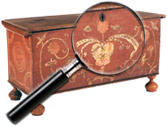|
|
Chinese Dynastic Chronology
Note: In general, the p4A reference database uses the Pinyin naming convention system for Chinese Terminology. Where the name varies under the Wade-Giles system p4A will present that alternative in brackets. For example: Qing [or Ch'ing] Dynasty.
Neolithic Period, circa 6500 to 1700 BC
Xia Dynasty, circa 2100 to 1600 BC
Shang Dynasty, circa 1600 to 1100 BC
Zhou [or Chou] Dynasty, circa 1100 to 256 BC Western Zhou, circa 1100 [...] Click here to continue reading.
The Japanese Meiji Period (1868-1911)
In 1867/68 the Tokugawa shogunate era came to an end with the restoration of imperial power to the emperor Meiji (died, 1912) and the transfer of the government from Kyoto to Tokyo. The actual political power was transferred from the Tokugawa Bakufu into the hands of a small group of nobles and former samurai.
Like other subjugated Asian nations, the Japanese were forced to sign unequal treaties with Western [...] Click here to continue reading.
Gustav Stickley (1858-1942)
Gustav Stickley is credited with creating the first distinctly American style of furniture known as Craftsman. He was born on March 9, 1858 in Osceola, Wisconsin to German immigrant parents. As the eldest of six children he went to work as a stonemason at the age of twelve when his father deserted the family in 1870. In 1875, Gustav (originally spelled with an “e”), Charles, and Albert Stickley learned basic furniture [...] Click here to continue reading.
William Lipton: Dealer, Scholar, Collector
William Lipton’s first journey to Asia occurred in the early 1970′s. He was immediately seduced by the culture of the East, and arranged for a return the following year with Jim Thompson at the Thai Silk Company, where he remained for six years, ultimately as the director of design. During this period he traveled extensively throughout Asia, often accompanied and advised by the Hong Kong dealer Charlotte Horstmann.
“I [...] Click here to continue reading.
Collection of Earle and Yvonne Henderson, Charming Forge Mansion, Womelsdorf, Pennsylvania
CHARMING FORGE MANSION¦AT A GLANCE
Charming Forge Mansion, located in Berks County, Pennsylvania, is nestled atop a hill overlooking a site that once buzzed with industrial activity and the clanking of a forge hammer. The forge is closed now and many of the buildings are gone but the mansion still looks out over the Tulpehocken Creek that once powered this magnificent [...] Click here to continue reading.
Thangka
A Thangka is a silk painting with embroidery, usually Tibetan. They were usually religious in nature and the subject matter would be a Buddhist Deity, a mandala, the Wheel of Life, events involving Lamas, or historical events. The Thangka was used as a teaching tool by traveling monks as they were light in weight, and easy to roll and carry.
Reference note by p4A editorial staff, August, 2011.
Fylfot Decorative Motifs
Fylfots are early design forms of the swastika. The design is frequently encountered in Pennsylvania Dutch decoration in a form that many say resembles a pinwheel. Never a widely used word, etymologists attribute the meaning to Middle English on the basis of one usage in a text from 1500. There, fylfot is used for the design because it was allegedly frequently used to “fill” the “foot” of a stained glass window [...] Click here to continue reading.
Suzani Textile – Central Asian
Suzanis are embroidered and decorative tribal textiles made in Tajikistan, Uzbekistan, Kazakhstan and other Central Asian countries, usually silk embroidery on cotton panels that could then be sewn together. They were were used in homes as wall decoration, bed covers or rugs, and traditionally made by young women to be given to their groom on the wedding day as part of their dowry.
Reference note by p4A editorial staff, July 2011.
Woolies
A woolwork picture of a ship – usually a sailing ship – is affectionately called a woolie. If it depicts anything else – a house, dog, flower – it is a woolwork picture. Woolies were the creation of British sailors who got caught up in the embroidery fad that infatuated their wives and daughters in the mid-to late-Victorian era.
The woolwork fad (also called Berlin work for the city where it began) [...] Click here to continue reading.
David Marshal “Carbine” Williams
A North Carolinian, universally known as “Carbine”, was born in 1900, Marsh Williams. Declining higher education and in 1921, he chose to operate a whiskey still around the Godwin area in the lowlands near Fayetteville, NC. Deputy Sheriff Al Pate led a raid on Williams’ still and was slain during the gun battle that raged at the still. Williams was tried and the jury was hung. He was tried a [...] Click here to continue reading.
|
Recent Articles
- Charles Alfred Meurer – American Artist & Tromp L’Oeil Artist
- Sendak, Maurice – American Artist & Writer
- Godie, Lee – American Artist
- Davis, Vestie – American Artist
- Bartlett, Morton – American Artist
- Mackintosh, Dwight – American Artist
- Evans, Minnie Jones – African-American Artist
- Mumma, Ed (Mr. Eddy) – American Artist
- Nice, Don – American Artist
- Savitsky, John (Jack) – American Artist
- Gordon, Harold Theodore (Ted) – American Artist
- Dial, Thornton – African-American Artist
- Doyle Sam – American Artist
- Johnson, Lester Frederick – American Artist
- Finster, Howard – American Artist
|
|
